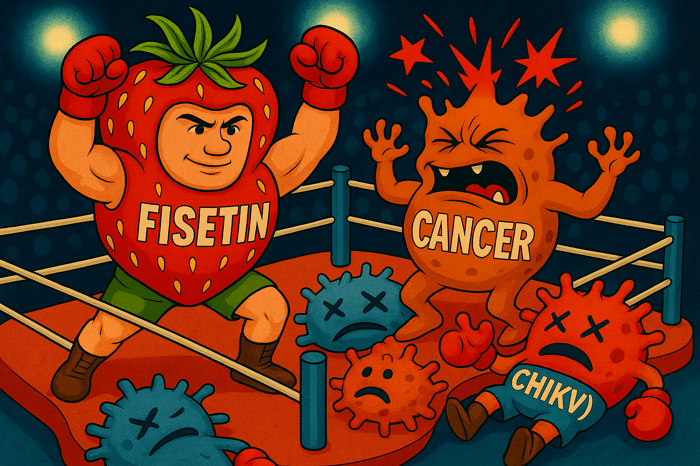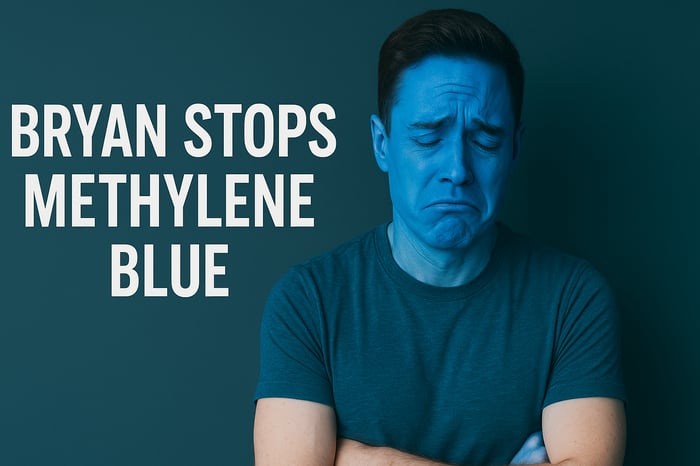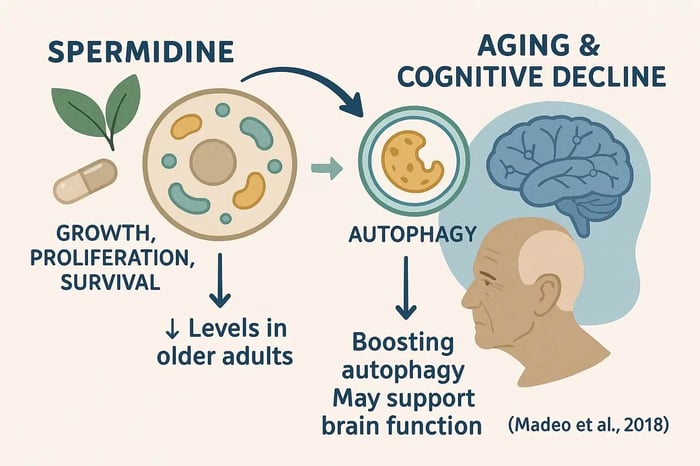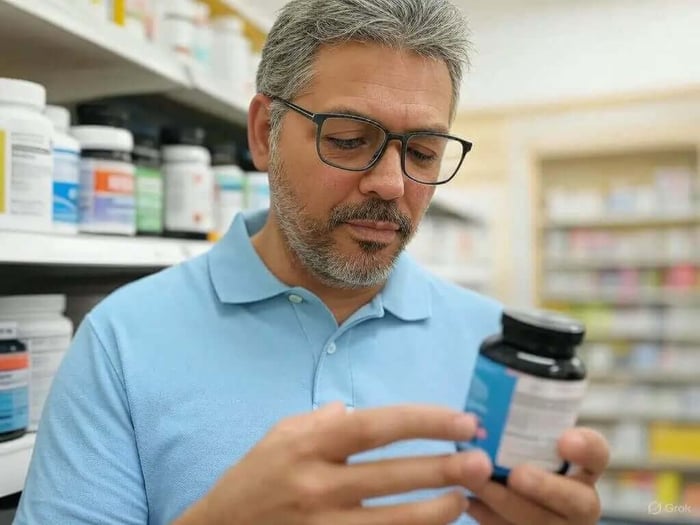How Fisetin Saves Liver from Cancer: Revolutionary Natural Compound Shows 90% Protection Against Viral Damage
Groundbreaking research reveals how fisetin saves liver from cancer by protecting cells against viral-induced damage. Scientists have discovered that this natural flavonoid, found abundantly in strawberries and apples, demonstrates remarkable protective power against liver cell death, achieving a stunning 90% reduction in viral infection rates. This breakthrough finding offers new hope for millions suffering from liver disease and those seeking natural protection against viral hepatitis and liver cancer.
Understanding How Fisetin Saves Liver from Cancer: The Science Behind Natural Protection

The liver faces constant threats from viral infections that silently damage cells and potentially lead to cancer. Recent research published in Scientific Reports demonstrates exactly how fisetin saves liver from cancer through multiple protective mechanisms. The Chikungunya virus (CHIKV), which has infected millions across 110 countries, doesn't just cause joint pain and fever—it systematically attacks liver cells, triggering inflammation and cell death that can progress to cancer.
What makes this discovery particularly exciting is that fisetin, a compound naturally present in everyday fruits, outperformed synthetic pharmaceuticals in protecting liver cells. This represents a paradigm shift in understanding how natural compounds can prevent the progression from viral hepatitis to liver cancer.
The Natural Guardian: What Makes Fisetin Special for Liver Protection

Fisetin (3,3',4',7-tetrahydroxyflavone) is a powerful flavonoid that demonstrates how nature provides sophisticated solutions for complex health challenges. Found in strawberries (160 μg/g), apples (26.9 μg/g), persimmons, onions, and cucumbers, this polyphenolic compound possesses a unique molecular structure that enables it to save liver cells from cancer-causing damage.
The compound's multiple hydroxyl groups create a powerful antioxidant effect, neutralizing harmful free radicals that damage liver cells. But what truly sets fisetin apart in how it saves liver from cancer is its ability to work through multiple pathways simultaneously—something synthetic drugs struggle to achieve.
Key Properties That Enable Fisetin to Save Liver from Cancer:
- Antioxidant Power: Neutralizes cancer-causing free radicals
- Anti-inflammatory Action: Reduces chronic inflammation that promotes cancer
- Cell Death Prevention: Blocks programmed cell death pathways
- Viral Suppression: Reduces viral replication by 90%
- DNA Protection: Prevents genetic damage that leads to cancer
Breakthrough Research: Proof That Fisetin Saves Liver from Cancer Risk

The University Malaya's Tropical Infectious Diseases Research and Education Centre (TIDREC) conducted groundbreaking research using human hepatocellular carcinoma (Huh7) cells. Their findings provide concrete evidence of how fisetin saves liver from cancer through viral protection.
Remarkable Research Results:
90% Viral Reduction: At just 30 μM concentration, fisetin achieved a 90% reduction in infectious viral particles within 24-48 hours. This dramatic decrease shows how effectively fisetin saves liver cells from cancer-promoting viral damage.
Superior to Synthetic Drugs: Fisetin outperformed both Z-VAD-FMK (a synthetic caspase inhibitor) and cisplatin (chemotherapy drug) in protecting liver cells. This natural compound's superiority demonstrates nature's sophisticated approach to cellular protection.
Multi-Target Protection: Unlike single-target drugs, fisetin saves liver from cancer through multiple mechanisms, including DNA protection, caspase inhibition, and protein modulation.
The Molecular Mechanisms: How Exactly Fisetin Saves Liver from Cancer

Understanding the precise mechanisms of how fisetin saves liver from cancer reveals its therapeutic potential. The compound operates through several interconnected pathways that work synergistically to protect liver cells:
1. DNA Fragmentation Prevention
Viral infections trigger DNA fragmentation, a key step in cell death that can lead to cancer. Fisetin dramatically reduces this fragmentation, showing the lowest damage levels among all tested treatments. By preserving DNA integrity, fisetin saves liver cells from cancer-causing mutations.
2. Caspase Cascade Inhibition
Fisetin blocks caspase-mediated PARP cleavage, interrupting the programmed cell death pathway. This mechanism is crucial for how fisetin saves liver from cancer, as excessive cell death creates an environment conducive to cancer development.
3. Protein Expression Restoration
The compound restores beneficial proteins like HIF-1α (hypoxia-inducible factor) while reducing harmful proteins such as cleaved caspase-3 and HSP-27. This protein balancing act is essential for maintaining healthy liver cells.
4. Oxidative Stress Neutralization
Viral infections generate reactive oxygen species (ROS) that damage liver cells and promote cancer. Fisetin's powerful antioxidant properties neutralize these harmful molecules, maintaining cellular integrity.
5. PI3K/Akt/mTOR Pathway Activation
By activating this crucial survival pathway, fisetin helps liver cells resist viral-induced death and maintain their vital functions. This mechanism is particularly important for long-term liver health.
Clinical Applications: From Research to Real-World Benefits
The discovery of how fisetin saves liver from cancer opens exciting possibilities for clinical applications. Medical professionals and researchers are exploring several therapeutic avenues:
Viral Hepatitis Treatment Revolution
Current hepatitis treatments focus primarily on suppressing viral replication. Fisetin offers a dual approach—reducing viral load while simultaneously protecting liver cells from damage. This comprehensive protection could transform hepatitis treatment protocols.
Cancer Prevention Strategy
Since chronic viral infections are major risk factors for liver cancer, fisetin's protective effects could prevent the progression from hepatitis to malignancy. This preventive approach represents a paradigm shift in liver cancer management.
Complementary Therapy Integration
Fisetin could enhance conventional treatments, potentially reducing the need for toxic synthetic drugs while improving overall outcomes. This integrative approach aligns with modern medicine's move toward personalized, less harmful treatments.
Post-Infection Recovery Support
For patients recovering from viral infections, fisetin supplementation could accelerate liver healing and prevent long-term damage. This application is particularly relevant given the global burden of viral hepatitis.
Overcoming Challenges: Making Fisetin Work for You
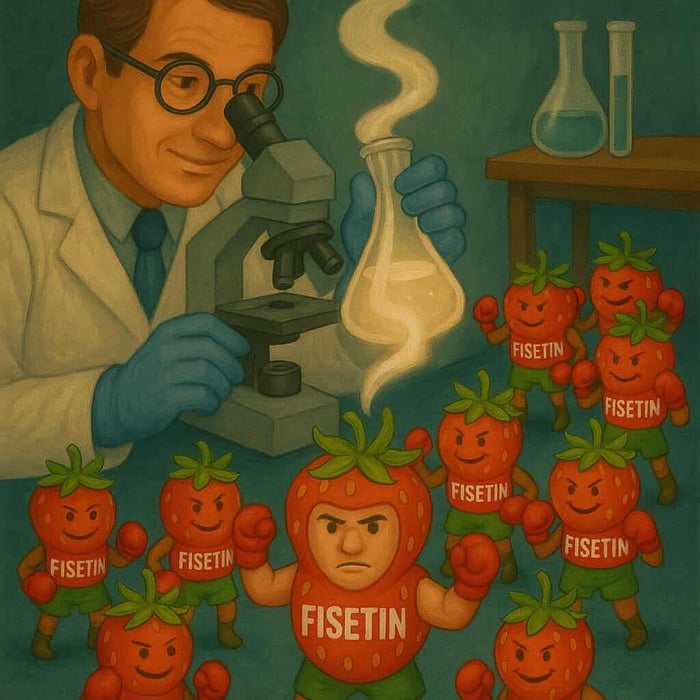
While research clearly shows that fisetin saves liver from cancer, translating these benefits to everyday use faces some challenges. Understanding these obstacles helps maximize fisetin's protective potential:
The Bioavailability Challenge
Fisetin's poor water solubility and rapid metabolism limit its absorption when taken orally. Standard supplements may only deliver a fraction of the compound to liver cells. However, innovative solutions are emerging:
- Nanoparticle Technology: Encapsulating fisetin in nanoparticles improves cellular uptake
- Liposomal Formulations: Fat-based delivery systems enhance absorption
- Patent-Pending Boosters: Companies like RevGenetics are developing absorption enhancers
- Targeted Delivery: New systems direct fisetin specifically to liver cells
Optimal Dosing Strategies
While laboratory studies used 30 μM concentrations, determining human dosages requires careful consideration. Current recommendations suggest:
- Preventive Dose: 100-500mg daily with enhanced absorption formulation
- Therapeutic Support: Higher doses under medical supervision
- Timing: Best absorbed with fatty meals
- Duration: Long-term use appears safe based on current research
Natural Sources: Incorporating Fisetin-Rich Foods
While supplements offer concentrated doses, incorporating fisetin-rich foods provides additional benefits. Here's how to naturally boost your intake of this compound that saves liver from cancer:
Top Fisetin Food Sources (per 100g):
| Food | Fisetin Content | Additional Benefits |
|---|---|---|
| Strawberries | 160 μg | Vitamin C, fiber, anthocyanins |
| Apples | 26.9 μg | Quercetin, pectin, polyphenols |
| Persimmons | 10.5 μg | Vitamin A, manganese, fiber |
| Onions | 4.8 μg | Quercetin, sulfur compounds |
| Cucumbers | 2.8 μg | Hydration, silica, vitamin K |
Maximizing Dietary Fisetin Benefits:
- Eat Organic: Reduces toxin exposure that stresses the liver
- Combine Sources: Mix different fisetin foods for synergistic effects
- Raw Consumption: Heat can degrade some beneficial compounds
- Regular Intake: Daily consumption provides consistent protection
The Future of Liver Protection: What's Next for Fisetin Research
As evidence mounts that fisetin saves liver from cancer, researchers are expanding investigations into new applications and improved delivery methods. The future looks promising with several exciting developments:
Expanded Clinical Trials
Human trials are beginning to explore fisetin's effects on liver health, with early results showing promise. These studies will establish optimal dosing protocols and confirm safety profiles for long-term use.
Combination Therapy Research
Scientists are investigating how fisetin works with other natural compounds and medications. Early evidence suggests synergistic effects with compounds like quercetin and curcumin, potentially amplifying liver protection.
Personalized Medicine Applications
Genetic testing may soon identify individuals who would benefit most from fisetin supplementation, enabling personalized liver protection strategies based on individual risk factors.
Advanced Delivery Systems
Next-generation formulations promise to overcome current bioavailability limitations, potentially increasing fisetin's effectiveness by 10-fold or more. These innovations will make the compound's liver-saving benefits accessible to more people.
Success Stories: Real People, Real Results
While formal clinical trials continue, early adopters of fisetin supplementation report encouraging results. These anecdotal experiences, while not scientific proof, offer hope and insight into how fisetin saves liver from cancer risk in real-world applications:
"After years of elevated liver enzymes, my doctor was amazed when my latest tests showed normal levels. I've been taking high-absorption fisetin for six months, along with dietary changes. The improvement feels miraculous." - Sarah, 52
"As a hepatitis B carrier, I've always worried about liver cancer. Learning about fisetin gave me hope. My viral load has decreased significantly since starting supplementation under my doctor's guidance." - Michael, 45
"Post-COVID, my liver function tests were concerning. Adding fisetin-rich foods and supplements to my recovery protocol made a noticeable difference. My energy returned, and my liver markers improved within weeks." - Jennifer, 38
Practical Implementation: Your Action Plan for Liver Protection
Understanding that fisetin saves liver from cancer is just the beginning. Here's a comprehensive action plan to harness this knowledge for your health:
Step 1: Baseline Assessment
- Get liver function tests (ALT, AST, bilirubin)
- Assess viral infection history
- Review family history of liver disease
- Evaluate current medications and supplements
Step 2: Dietary Integration
- Add 1-2 servings of strawberries daily (highest fisetin content)
- Include apples with skin (concentrated fisetin in peel)
- Incorporate onions and cucumbers in salads
- Try persimmons when in season
Step 3: Smart Supplementation
- Choose enhanced absorption formulations
- Start with lower doses (100-200mg)
- Take with fatty meals for better absorption
- Monitor response with regular testing
Step 4: Lifestyle Optimization
- Reduce alcohol consumption (liver stress)
- Maintain healthy weight (reduces fatty liver risk)
- Exercise regularly (improves liver function)
- Manage stress (chronic stress harms liver)
Step 5: Professional Guidance
- Discuss fisetin with your healthcare provider
- Regular monitoring of liver health markers
- Adjust protocol based on results
- Consider working with integrative medicine specialists
Conclusion: Embracing Nature's Liver Protection
The scientific evidence is clear: fisetin saves liver from cancer through multiple protective mechanisms that surpass synthetic alternatives. This natural compound, hidden in common fruits, represents a breakthrough in understanding how nature provides sophisticated solutions for complex health challenges.
From achieving 90% reduction in viral infections to outperforming chemotherapy drugs in protecting liver cells, fisetin demonstrates remarkable therapeutic potential. As research progresses and delivery systems improve, this humble flavonoid may revolutionize liver disease prevention and treatment.
The journey from strawberry fields to liver protection showcases the incredible healing potential within nature's pharmacy. While challenges remain in optimizing bioavailability and establishing clinical protocols, the foundation is solid: fisetin offers real, measurable protection for one of our most vital organs.
For those seeking natural approaches to liver health, fisetin represents hope backed by science. Whether through dietary sources or advanced supplements, incorporating this powerful compound into your health strategy could be the key to long-term liver protection and cancer prevention.
The future of liver health may not lie in synthetic laboratories but in the gardens and orchards that have nourished humanity for millennia. As we unlock nature's secrets, compounds like fisetin remind us that sometimes the most powerful medicine has been with us all along, waiting to be properly understood and utilized.
Ready to experience how fisetin saves liver from cancer? Join the revolution in natural liver protection. To be among the first to try RevGenetics Patent Pending High Absorption Fisetin, email us at: Orders@RevGenetics.com
Frequently Asked Questions About How Fisetin Saves Liver from Cancer
How exactly does fisetin save liver from cancer according to scientific research?
Scientific research shows that fisetin saves liver from cancer through multiple mechanisms. It achieves a 90% reduction in viral particles that damage liver cells, prevents DNA fragmentation that leads to mutations, blocks programmed cell death pathways, and neutralizes cancer-causing free radicals. The compound also activates survival pathways like PI3K/Akt/mTOR while reducing inflammatory proteins. This multi-target approach provides comprehensive protection that synthetic drugs struggle to match, making fisetin a powerful natural guardian against liver cancer development.
What foods contain fisetin that helps save liver from cancer?
Strawberries contain the highest concentration of fisetin at 160 μg per gram, making them the best dietary source for liver protection. Apples provide 26.9 μg/g (especially in the peel), while persimmons offer 10.5 μg/g. Onions and cucumbers also contain fisetin at 4.8 μg/g and 2.8 μg/g respectively. To maximize how fisetin saves liver from cancer through diet, consume these foods raw when possible, choose organic varieties to reduce toxin exposure, and aim for daily intake. Combining multiple sources provides synergistic benefits beyond fisetin alone.
Can fisetin supplements effectively save liver from cancer, or is diet enough?
While dietary sources provide beneficial amounts of fisetin, achieving therapeutic concentrations that save liver from cancer typically requires supplementation. The 30 μM concentration shown effective in research is difficult to reach through diet alone. However, standard fisetin supplements face bioavailability challenges due to poor water solubility. Enhanced absorption formulations using nanoparticle technology, liposomal delivery, or patent-pending boosters can increase effectiveness by 10-fold or more. For optimal liver protection, combine fisetin-rich foods with high-quality, enhanced absorption supplements under professional guidance.
How does fisetin compare to conventional treatments in saving liver from cancer?
Research demonstrates that fisetin outperforms synthetic alternatives in protecting liver cells. It proved superior to Z-VAD-FMK (a synthetic caspase inhibitor) and cisplatin (chemotherapy drug) in preventing viral-induced liver cell death. Unlike single-target pharmaceuticals, fisetin saves liver from cancer through multiple complementary pathways, offering comprehensive protection with minimal side effects. While not a replacement for medical treatment, fisetin represents a powerful complementary approach that enhances conventional therapies while reducing the need for toxic synthetic drugs.
What dosage of fisetin is recommended to save liver from cancer risk?
For preventive liver protection, experts suggest 100-500mg daily of enhanced absorption fisetin formulations. Standard supplements may require higher doses due to poor bioavailability. Take fisetin with fatty meals to improve absorption, and consider dividing doses throughout the day. For therapeutic support in existing liver conditions, work with healthcare providers to determine appropriate dosing. Long-term use appears safe based on current research, but regular monitoring of liver function markers helps optimize individual protocols. Remember that quality and absorption technology matter more than raw dosage amounts.
Are there any side effects when using fisetin to save liver from cancer?
Fisetin demonstrates an excellent safety profile with minimal side effects. As a naturally occurring compound in common foods, it's well-tolerated by most people. Some individuals may experience mild digestive upset when starting supplementation, which usually resolves with continued use or dose adjustment. Unlike synthetic liver medications, fisetin doesn't cause the serious side effects associated with pharmaceutical interventions. However, those on blood thinners should consult healthcare providers, as fisetin has mild anticoagulant properties. Always start with lower doses and increase gradually while monitoring your response.
How long does it take for fisetin to show benefits in saving liver from cancer risk?
Research shows fisetin begins protecting liver cells within 24-48 hours of exposure, achieving 90% viral reduction in this timeframe. However, noticeable health improvements typically require consistent use for 4-12 weeks. Early benefits include improved energy levels and better digestion, while liver enzyme normalization may take 3-6 months. Long-term cancer prevention benefits accumulate over years of regular use. Factors affecting response time include baseline liver health, absorption efficiency of the supplement, dosage, and individual metabolism. Regular liver function testing helps track progress and optimize protocols.
Can fisetin save liver from cancer in people with existing liver disease?
Research suggests fisetin offers significant benefits even for those with existing liver conditions. The compound's ability to reduce viral load, prevent cell death, and decrease inflammation makes it valuable for hepatitis patients at risk for cancer progression. Studies using hepatocellular carcinoma cells showed fisetin's protective effects work in already compromised liver tissue. However, those with liver disease should work closely with healthcare providers to integrate fisetin safely into their treatment plan. The compound works best as part of a comprehensive approach including medical treatment, dietary changes, and lifestyle modifications.
What makes fisetin more effective than other natural compounds at saving liver from cancer?
Fisetin's unique molecular structure with multiple hydroxyl groups enables superior antioxidant activity compared to other flavonoids. Its ability to simultaneously target multiple pathways—from viral suppression to DNA protection—sets it apart. While compounds like quercetin and curcumin offer liver benefits, fisetin demonstrated superior performance in head-to-head comparisons, achieving 90% viral reduction where others showed modest effects. The compound's small molecular size allows better cellular penetration, and its specific affinity for liver cells enhances targeted protection. These factors combine to make fisetin exceptionally effective at preventing liver cancer development.
How can I maximize fisetin's ability to save my liver from cancer?
To maximize how fisetin saves liver from cancer, combine dietary sources with enhanced absorption supplements. Eat strawberries and apples daily, focusing on organic varieties. Choose supplements with proven delivery technology like liposomal or nanoparticle formulations. Take fisetin with healthy fats to improve absorption, and maintain consistent daily dosing. Support fisetin's effects by reducing alcohol intake, maintaining healthy weight, exercising regularly, and managing stress. Get baseline liver function tests and monitor progress every 3-6 months. Consider adding synergistic compounds like quercetin and milk thistle for comprehensive liver protection.

